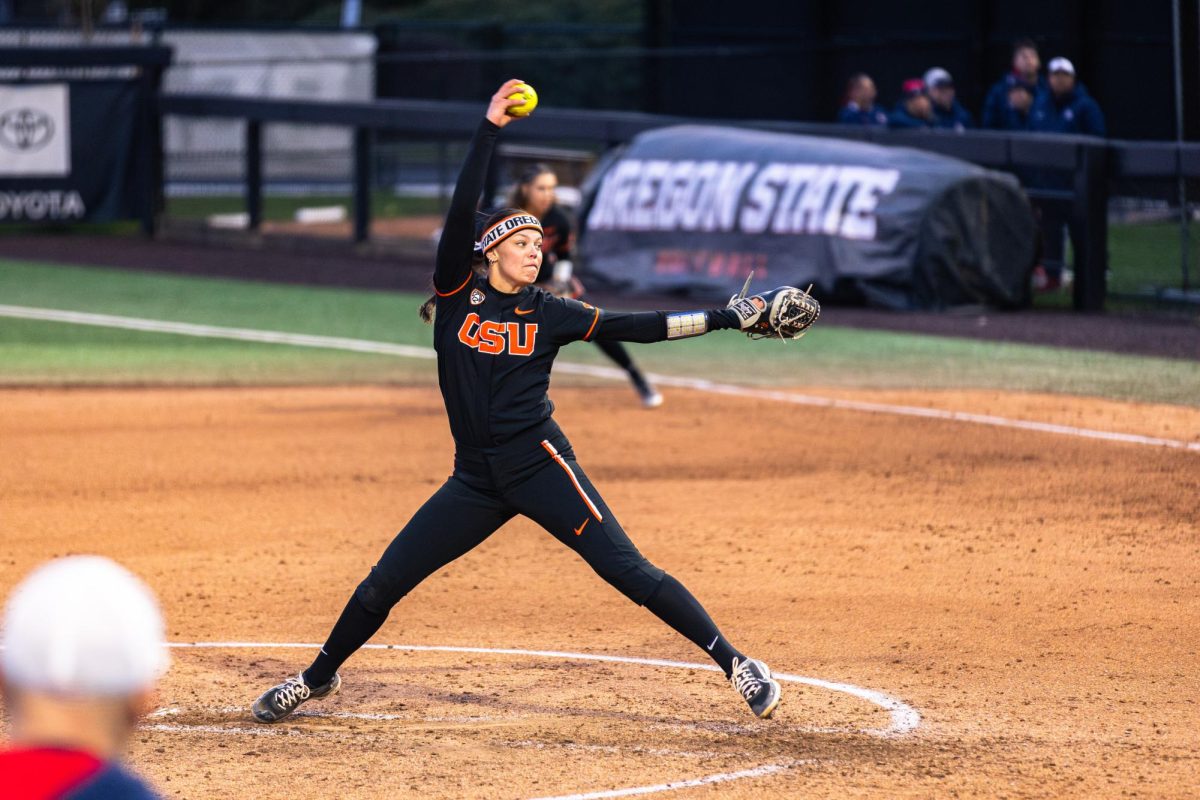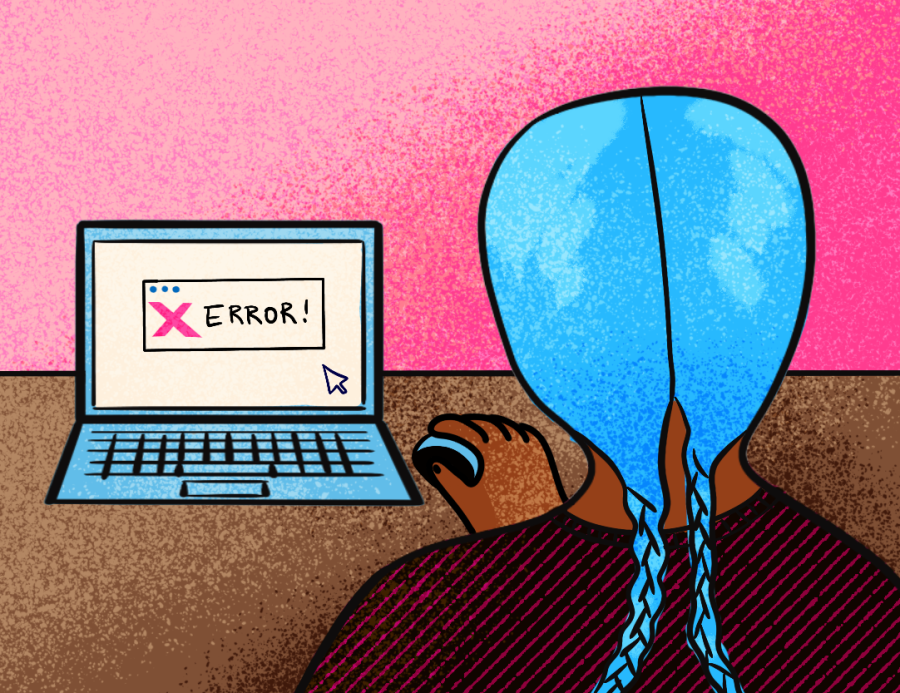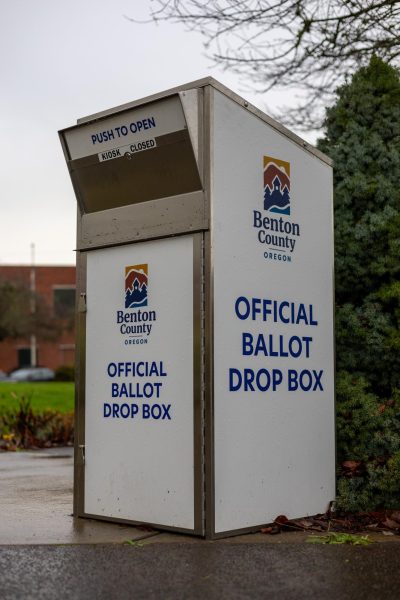OSU librarians suspend negotiations with worldwide scholarly information provider
An illustration depicting a student having trouble accessing a website. Recently, librarians suspended negotiations with Elsevier due to the inability for the two entities to reach an agreement.
January 17, 2023
Oregon State University librarians have launched new services in lieu of suspended negotiations with Elsevier, one of the largest publishers of scholarly information in the world.
The Valley Library’s contract with Elsevier did not renew on Jan. 1, 2023, as librarians could not reach an agreement with Elsevier, adding OSU to the long list of universities and companies who have boycotted the scholarly information giant in recent years.
Elsevier is an academic publishing company that provides scholarly resources to many universities in the U.S. According to Elsevier’s website, its research platforms are regularly used by more than 16 million scientists and physicians.
However, many universities in the past couple years have ended their contracts with Elsevier. And now, OSU has decided to do the same.
Edward Feser, OSU provost and executive vice president, wrote in a statement on Nov. 17, 2022, that although subscription access to Elsevier journals is terminated, OSU researchers will still be able to publish and review scholarly information in Elsevier journals.
The University of Oregon and Portland State University also decided against renewing their contracts with Elsevier, as problems with transparency in price hikes and authors’ rights for their published work plague negotiations, Feser wrote.
Anne-Marie Deitering, the dean of libraries, said that though negotiations for a future contract with Elsevier will continue later this year, The Valley Library is launching new services to ensure campus-wide access to scholarly information.
“We will be providing some services and adding some content that we have not had before,” Deitering said. “We are also taking steps to ensure that we will continue to have access to some of the same resources we had while our Elsevier contract was active.”
Deitering and Kerri Goergen-Doll, interim associate dean and director of the Resource Acquisitions and Sharing department at OSU, pride themselves on The Valley Library’s Interlibrary Loan service, which delivers scholarly resources from other libraries to students and researchers at OSU.
A new Article Delivery service launched in response to the Jan. 1 contract termination speeds up the Interlibrary Loan service, and gives OSU usage data that provides librarians a clear picture of journal titles, allowing them to assess which scholarly information subscriptions are used most. According to Deitering and Goergen-Doll, while funding for other article sources is still needed, the Interlibrary Loan services and Article Delivery service will continue through the foreseeable future.
“We are also investing some of the savings from our Elsevier contract into other resources,” Deitering and Goergen-Doll said. “We recently upgraded our Academic Search Premier database to Academic Search Complete, adding about 1,000 additional journals… [which] is designed to support undergraduate research needs.”
In addition, for many of the high-use journals, OSU will still have access to the volumes and issues of those journals that were received before the contract termination, Deitering said.
As the 2020 pandemic shifted more classes online, digital scholarly information continues to complement, or even substitute, physical textbooks and other printed materials found in libraries and on-campus bookstores.
Ariah Tesema, a fourth-year biohealth science undergraduate, added that she uses open source material and other online scholarly information out of convenience.
“I definitely use [online] scholarly information more than going to the library, because usually I’ll be doing my homework at night,” Tesema said. “I’ll find it quicker (online) than if I call the library.”
As important as access to scholarly information may be to students and researchers at OSU, Deitering and Goergen-Doll said Elsevier failed to satisfy a set of principles that OSU librarians developed with faculty from all colleges, which were endorsed by the OSU Faculty Senate in May 2022, during negotiations.
Deitering said that Elsevier has had problems with the principle of fair and sustainable pricing, based on transparent and cost-effective pricing models, in the past.
“Elsevier’s prices are notoriously opaque,” Deitering said. “How prices for individual titles are set is not transparent, and some of these costs are based on the print market of several years ago; they also include several different types of fees and extra charges, and it is not transparent what value these fees are paying for.”
However, Deitering and Goergen-Doll said their pause in negotiations was not a “simple attempt to save money,” but rather, a decision to not compromise what they believe in.
“Scholarly information costs money, to produce and to preserve,” Deitering and Goergen-Doll said. “We need to think of this as a change in how we are investing our scholarly communication dollars — do we give it all to for-profit publishers who do not share OSU’s mission and goals, or do we shift some of that money to projects that are more open, equitable and community-based?”
Deitering and Goergen-Doll said that they also take issue with how authors are treated within the scholarly information market.
“More and more content in Elsevier’s subscription-based, paywalled journals is available open access because the article authors have paid expensive fees to make it so,” Deitering said. “Researchers are paying these fees, which are supposed to cover the costs of production, but the price of the journals have not changed.”
Though OSU librarians have suspended negotiations with Elsevier, Deitering said that problems with scholarly information providers remain system-wide.
“The ways we access and share scholarly research today reflect a business model that restricts the public’s access to high-quality, expert research and reinforces existing inequities and hierarchies in scholarly publishing,” Deitering said. “This only demonstrates that allowing a small group of publishers to control huge amounts of research, and use it in ways that prioritize their profits above all other values, does harm.”
Eldevier was unable to be reached by the Barometer for comment.























































































































